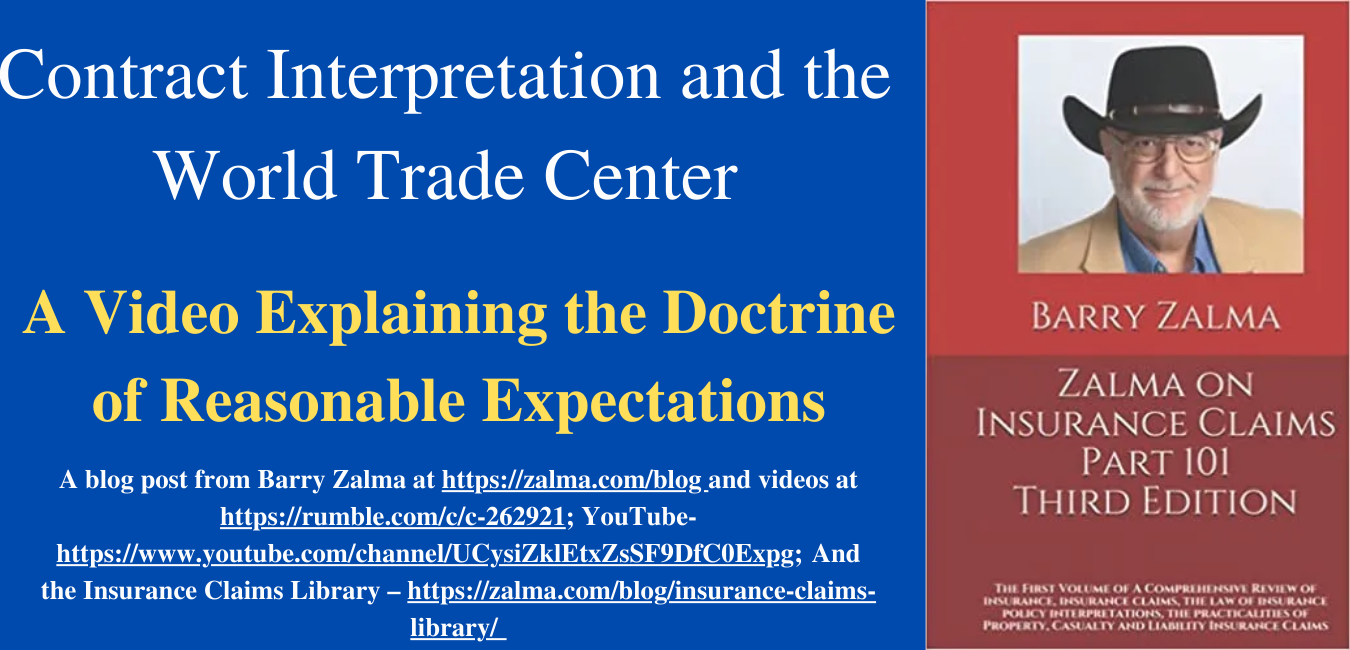-
News Feed
- EXPLORE
-
Pagini
-
Grupuri
-
Events
-
Blogs
-
Marketplace
-
Offers
-
Jobs
-
Developers
Contract Interpretation and the World Trade Center

A Video Explaining the Doctrine of Reasonable Expectations
Read the full article at https://www.linkedin.com/pulse/contract-interpretation-world-trade-center-barry-zalma-esq-cfe and see the full video at https://youtu.be/BvhlHaxVjPU and at https://rumble.com/vnp1le-contract-interpretation-and-the-world-trade-center.html and at https://zalma.com/blog plus more than 3950 posts.
The act of infamy at the World Trade Center (WTC) in New York City on September 11, 2001, is responsible for a great deal of insurance litigation concerning, among other things, the meaning of the term “occurrence” in first party property policies and the methodology required of insurers when interpreting a policy of insurance. In the WTC policies, “occurrence” was defined as follows:
“Occurrence” shall mean all losses or damages that are attributable directly or indirectly to one cause or to one series of similar causes. All such losses will be added together and the total amount of such losses will be treated as one occurrence irrespective of the period of time or area over which such losses occur.
Because WTC insurance issues are surrounded by the horrendous facts of the attack, and due to the fact that some policies had yet to be printed and delivered to the insured before September 11, 2001, the decisions rendered in interpreting the policies had far-reaching impact. The rulings in the WTC cases, combined with a decision of the California Supreme Court, are changing how insurance policies are interpreted. Since policy interpretation is essential to the presentation of any insurance claim, the following detailed discussion is important to all those concerned with insurance claims.
“Reasonable expectations” does not mean, however, that the expectations of the insured can change or modify the clear and unambiguous language of the policy of insurance. The Third Circuit found, in Canal Insurance v. Underwriters, against the insured’s claim of reasonable expectations, finding that in the context of the case before it “the refusal to look beyond the plain meaning of the unambiguous exclusionary language to Singh’s reasonable expectations is consistent with the interpretation of Pennsylvania case law in our Circuit.”
For example, a case decided over 200 years ago made the point that the reasonable expectations of the insured include the understanding that “every [insurer] is presumed to be acquainted with the practice of the trade he insures…. If he does not know it, he ought to inform himself.” Similarly, more than 150 years ago the US Supreme Court in Hazard’s Administrator v. New England Marine Insurance Co., 33 U.S. 557 (1834) adopted the rule. It concluded that “no injustice is done if insurers are presumed to know their insureds’ industry because it is part of their ordinary business.”
We are 100% funded for October.
Thanks to everyone who helped out. 🥰
Xephula monthly operating expenses for 2024 - Server: $143/month - Backup Software: $6/month - Object Storage: $6/month - SMTP Service: $10/month - Stripe Processing Fees: ~$10/month - Total: $175/month
- Art
- Causes
- Crafts
- Crime
- Dance
- Drinks
- Film
- Finance
- Fitness
- Food
- Jocuri
- Gardening
- Health
- Home
- Literature
- Music
- Networking
- Paranormal
- Alte
- Politics
- Director
- News
- Party
- Science
- Religion
- Shopping
- Sports
- SyFy
- Politically Incorrect
- Philosophy
- Theater
- Technology
- Wellness



